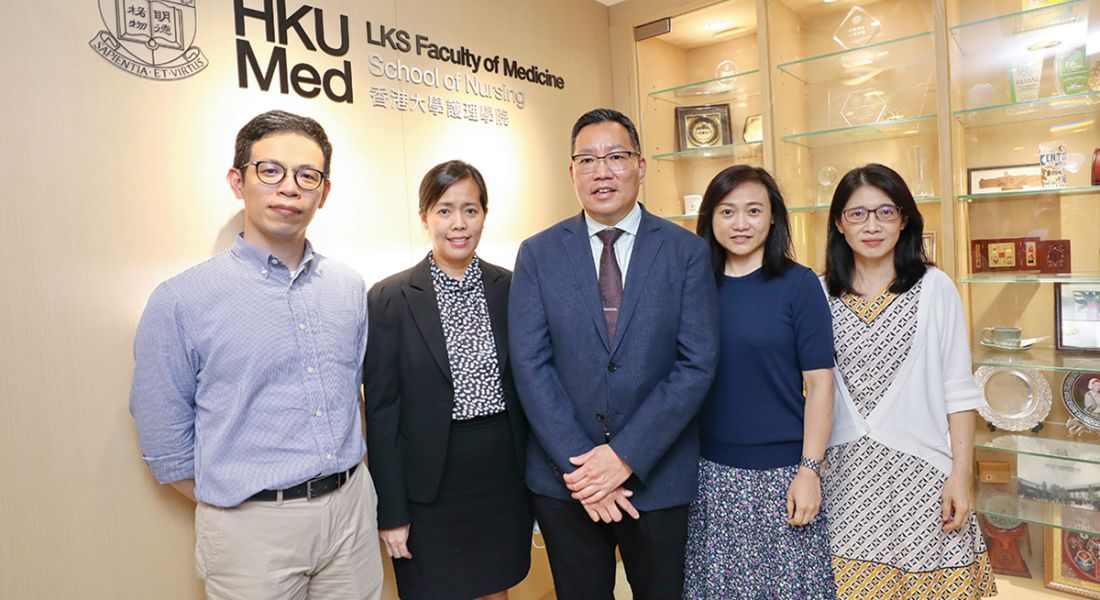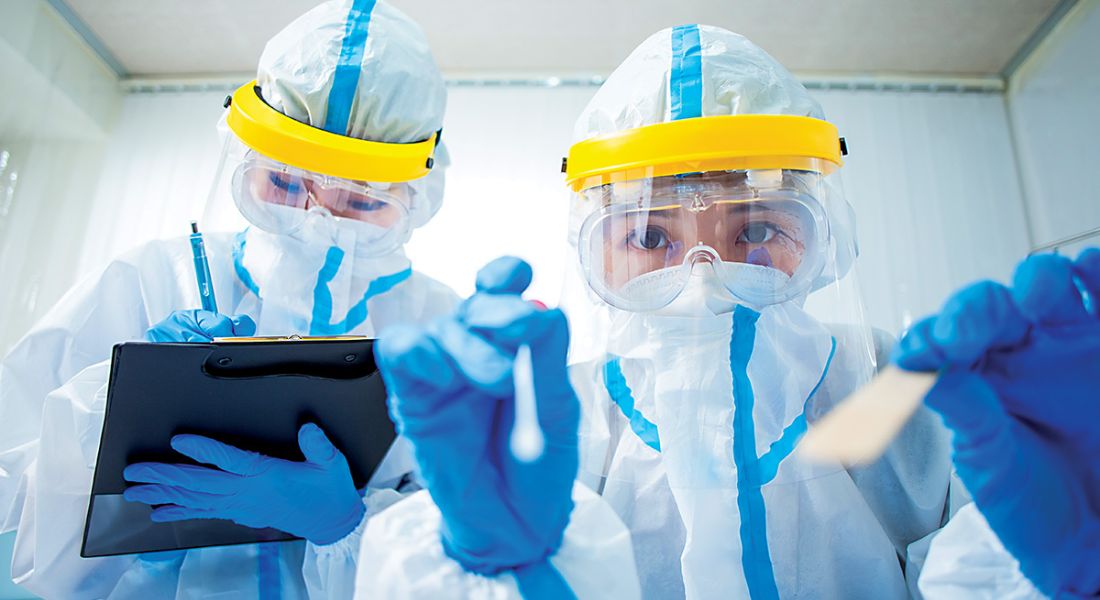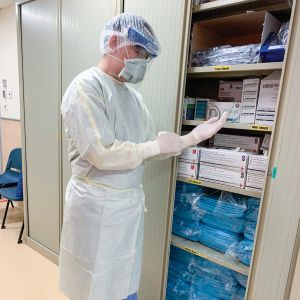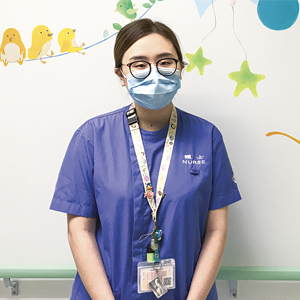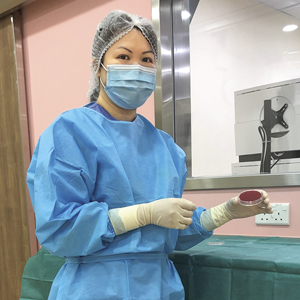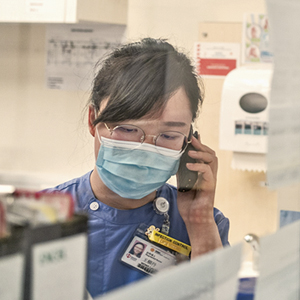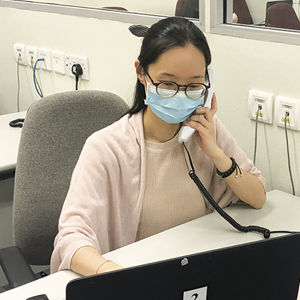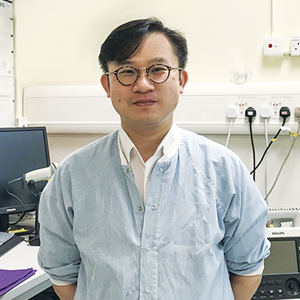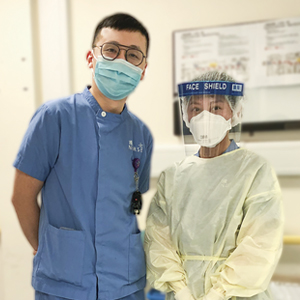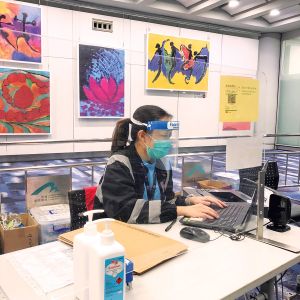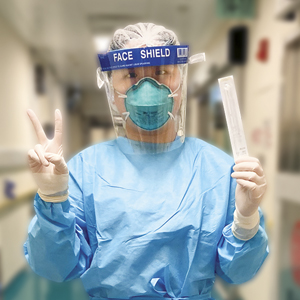HKU Nursing Graduates:
Backbone of Health Service
During COVID-19 Pandemic
Dr Kelvin Wang | Director, Master of Nursing Programme
Dr Janet Wong | Director, Bachelor of Nursing (FT) Programme
Dr Polly Chan | Director, Bachelor of Nursing (PT) Programme for RN
Dr Mandy Ho | Associate Director, Master of Nursing Programme
Dr William Li | Director, Doctor of Nursing Programme
The COVID-19 pandemic has been an unprecedented threat to public health in Hong Kong and the world. The School’s graduates have played a critical role in addressing this threat, thanks to specialized training that was rolled out by the School following the 2003 SARS outbreak.
On top of teaching standard infectious control practices to students, the School has worked closely with infection control experts from microbiology, clinical infection medicine, infection control nurses and community partners to provide intensive and comprehensive training. Since 2010, 1,223 nurses have attended Certificated Infection Control Courses (ICC) taught by the School in collaboration with HKU’s Department of Microbiology. We have also provided an infection control track under our Master of Nursing program since 2009 to cultivate leaders in infection control nursing.
Our BN, MN and DN graduates have applied their learning at the frontlines, in clinical and public health settings, to combat COVID-19. Graduates working in the Department of Health have been enforcing the Public Health Ordinance (Prevention and Control of Disease), which includes (but not limited to) screening and assessing inbound travelers, supporting quarantine measures (e.g. home-containment) for high risk groups, contact tracing of confirmed cases and coordinating the logistic for such a large operation. Apart from administering these important epidemiological services, they have also been providing psychological support to patients and families to ease their fears and anxieties about COVID-19 and providing accurate and updated health education and information.
These actions contributed substantially to the successful containment of outbreaks in early 2020, which meant the city did not need to go into lockdown.
Nurses in hospitals also had an important role to play in Hong Kong’s response to COVID-19. As of 6 Aug 2020, Hong Kong had 3,754 confirmed cases. Admitting a large number of cases into hospitals over a short period requires extraordinary collaboration between health care professionals from different specialties. Our graduates have provided professional services in various clinical and community settings. Some have volunteered to establish isolation wards in a very short time, which put their excellent leadership skills to work. Others have manned intensive care units. Not only are they having to coordinate various professionals, they also are tasked with the accurate delivery of complex medical treatments for COVID-19 patients.
Another group of nurses have been at the frontline of emergency departments, where they triage and screen potential cases and coordinate the admission of cases. We also have graduates in the infection control team that is working behind the scenes to maintain up-to-date and appropriate infection control guidelines and safeguard their colleagues’ infection prevention practices. Our nurses have heavy responsibilities in our community, too, particularly in elderly care homes which have been most vulnerable to the virus. Our graduates working in community nursing and elderly services have had their hands full in preventing outbreaks.
Many of the School’s graduates volunteered to join the COVID-19 team so they could be part of a phenomenal effort to provide clinical care and, mostly important, therapeutic nursing care to patients and their families. The extra efforts they have put in have helped to maintain high quality services for patients in Hong Kong and ensure the healthcare system does not get overwhelmed.
As Winston Churchill said: “Fear is a reaction. Courage is a decision!” It is unrealistic to say nurses or any medical professionals have been fearless in the face of COVID-19, but we can choose to “Keep calm and carry on” and execute our duties as caring professionals.
Experience Sharing from Our Alumni and Students
Chan Ching-ho
BN (PT) RN Programme Year 2 Student
It was so timely for me to be learning about ‘Management and Leadership’ and ‘Epidemiology and Population Health’ because I could reflect on the real situation of COVID-19. I gained a better appreciation of the role leaders play in guiding teams to respond to the changing demands of COVID-19 in the clinical setting. I also got a better understanding of the epidemiological effects on population health from this disease.
Bonnie Wong
BN (FT) & MN Programmes Graduate
By understanding the work of the infection control team, I know that compliance in basic practices, like hand hygiene and proper PPE wearing, is of the utmost importance to protect both patients and healthcare workers. Being vigilant at every step of care safeguards our healthcare system.
Leanna Wong
BN (FT) & MN Programmes Graduate
COVID-19 is a devastating global catastrophe. This is definitely a hard time for all of us as healthcare workers. However, we believe our hard work will pay off someday. Together as a team, we will be able to overcome any challenges. I would like to thank the public for their support of our work in fighting COVID-19.
Vivian Wong
MN Programme Graduate
As infection control nurses, we are responsible for ensuring stringent implementation of infection control measures during the pandemic to prevent the risk of infection among healthcare workers. When there is a shortage of resources, for example, PPE, the work becomes difficult. But through collaboration between various departments and parties, the common goal of infection control can be achieved.
Newton Wong
MN Programme Graduate
In light of the large scale global public health crisis, I want to share with my fellow colleagues and those who aspire to become nurses a quote from Florence Nightingale – ‘Nursing is an art: and if it is to be made an art, it requires an exclusive devotion as hard a preparation as any painter's or sculptor's work; for what is the having to do with dead canvas or dead marble, compared with having to do with the living body, the temple of God's spirit? It is one of the Fine Arts; I had almost said, the finest of the Fine Arts.’
Jacqueline Woo
BN (FT) & MN Programmes Graduate
Public health nurses play a very important role during this global pandemic. Being involved in case tracking, preventing community outbreaks, providing support to confirmed COVID-19 patients and their families, etc., are all valuable experiences and learning opportunities for me.
Terrance Cheung
DN Programme Graduate
From this pandemic, we see nurses uphold their professionalism and we understand that the nursing profession is closely associated with public health. I hope fellow nurses will equip themselves and take up challenges. And to those who aspire to become a nurse – nursing is not easy, but it is truly meaningful.
Ronald Cheung
BN (FT) & MN Programmes Graduate
As Shift in-charge, I have the responsibility to ensure colleagues have a safe and efficient working environment. I have worked with Advanced Practice Nurses to plan the ward routine care and workflow around patients’ journeys, which involves substantial medical management knowledge. Health informatics also plays an important role in clinical management. We use information technology to strengthen communications between wards, exchange information about patients’ conditions and occupancy rate and increase time efficiency.
Kenneth Yip
BN (FT) Programme Graduate
Combating the pandemic is part of my responsibility as a nurse. As long as I follow the procedures and steps carefully, I can rest assured that I am safe. Fighting against the pandemic has also given me the opportunity to gain a lot of experiences and grow a lot. In particular, I have had the chance to work with nurses from different backgrounds and expertise, and we share, support and learn from each other.
Jessica Cheng
BN (FT) & MN Programmes Graduate
With the occurrence of this global pandemic, nurses should understand the importance of working together to protect each other. If we can protect ourselves, we can then protect our families and we will soon win this battle. The pressure that healthcare workers face has been increasing from SARS to COVID-19. People who aspire to be nurses should not only be enthusiastic about the profession, but also mentally prepared to face the challenges as we don’t know when the epidemic will end.
Mary Choy
BN (FT) Programme Graduate
We have to be alert at all times when handling patients even if they have the slightest symptoms, especially because there are still unknowns about the disease. Infection control knowledge is important. It is only when I have a better understanding of the virus transmission method that I can protect myself and educate patients.


